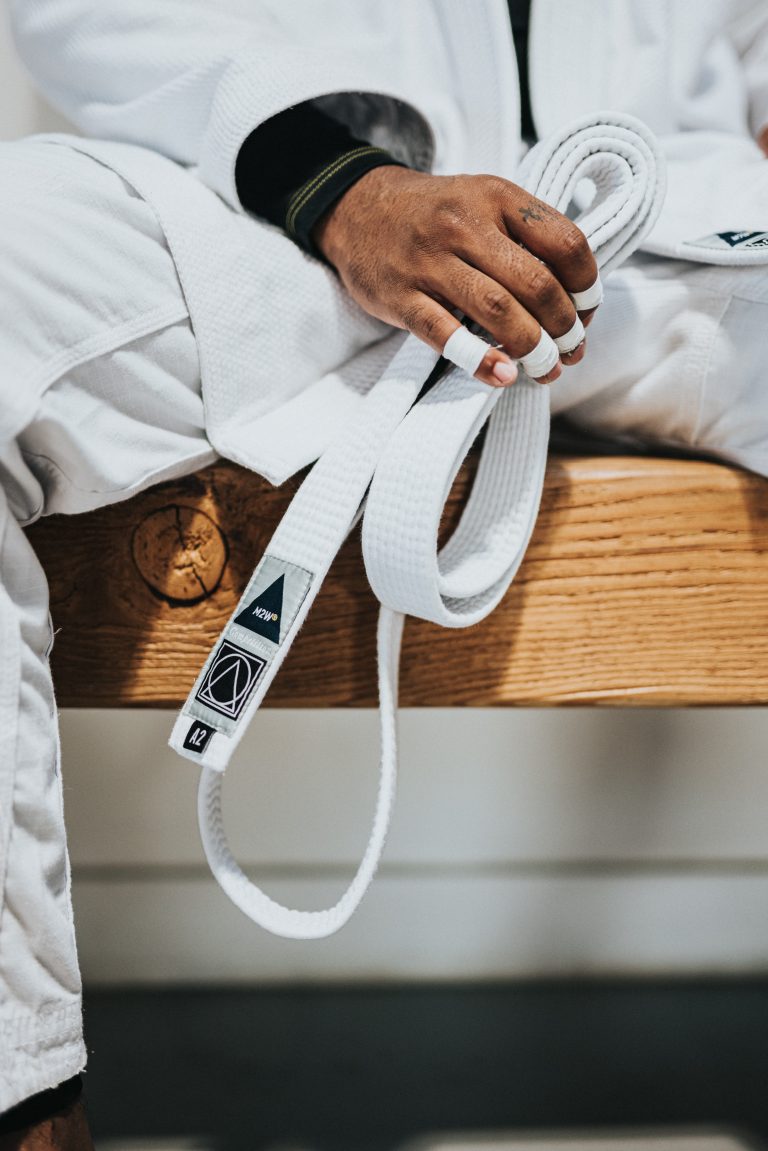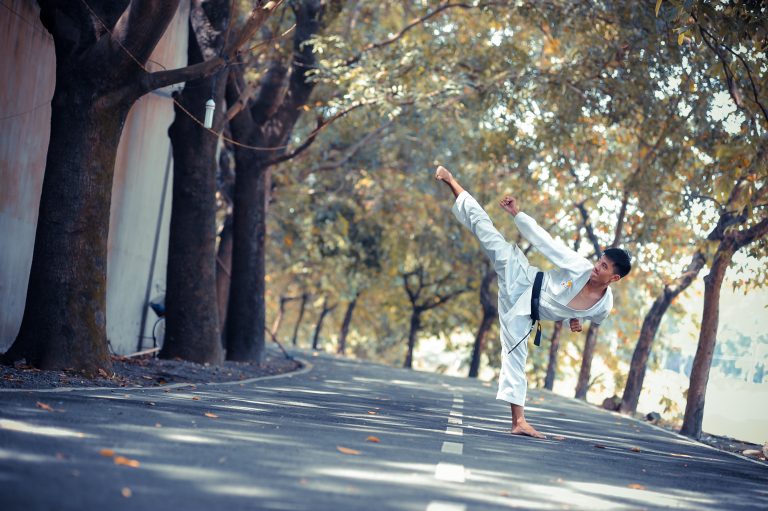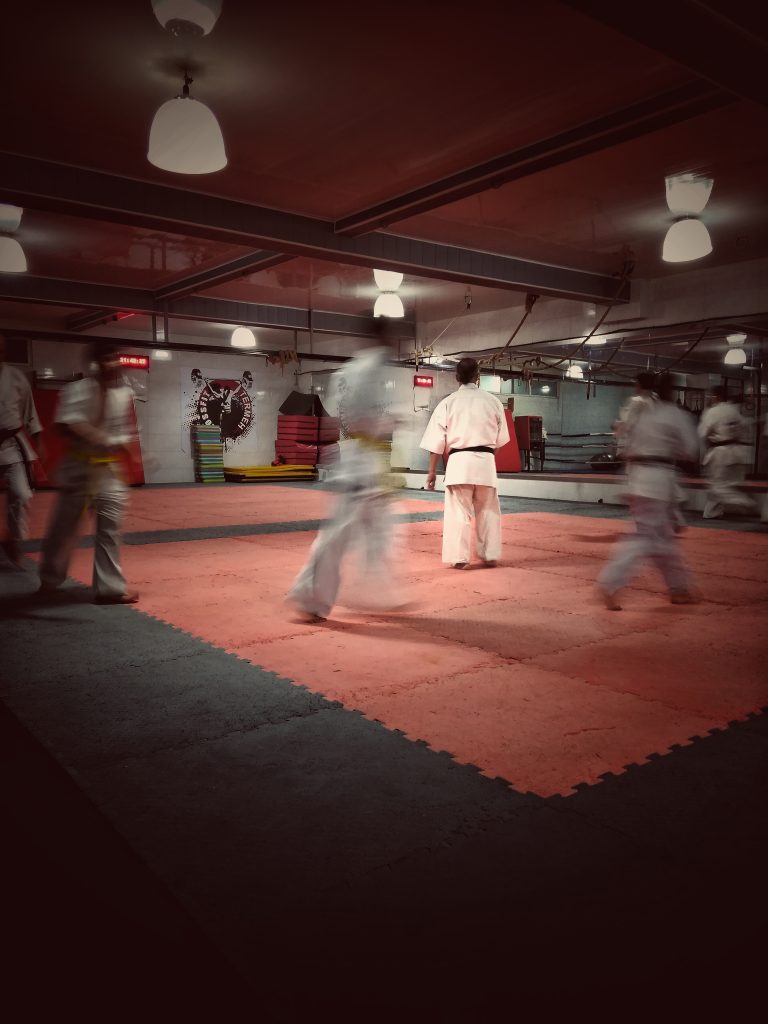Regeln und Vorschriften im Karate
Karate ist eine Kampfkunst, die aus Japan stammt. Es ist bekannt für seine schnellen, kraftvollen und präzisen Techniken. Wie bei jeder anderen Sportart gibt es auch im Karate Regeln und Vorschriften, die von den Ausübenden befolgt werden müssen. In diesem Artikel werden wir uns einige der wichtigsten Regeln und Vorschriften im Karate ansehen.
Karate Uniformen
Einer der wichtigsten Aspekte von Karate ist das Tragen der richtigen Uniform. Die Karate Uniform, auch bekannt als “Gi”, besteht aus einer Jacke, Hose und einem Gürtel. Die Farbe des Gürtels gibt an, auf welchem Niveau der Karateka sich befindet. Es ist wichtig, dass die Uniform sauber und ordentlich ist, damit der Karateka sein Bestes geben kann.
Achtung auf den Sensei
Der Sensei, der Karatelehrer, hat eine große Autorität und sollte daher respektiert werden. Wenn der Sensei spricht, sollten alle Schüler ihm aufmerksam zuhören. Der Sensei sollte nicht unterbrochen werden und seine Anweisungen sollten befolgt werden.
Kampfsport ohne Gewalt
Obwohl Karate eine Kampfkunst ist, sollte kein Gelegenheit für Gewalt oder Aggressivität gegeben werden. Der Karateka sollte niemals seinen Gegner absichtlich verletzen. Stattdessen sollte der Karateka seine Fähigkeiten nutzen, um den Gegner zu kontrollieren.
Disziplin und Respekt
Karate vermittelt Disziplin und Respekt. Die Schüler sollten ihre Mitmenschen, ob sie nun Karateka sind oder nicht, respektieren und höflich sein. Die Schüler sollten auch ein hohes Maß an Disziplin haben, um ihre Fähigkeiten zu verbessern und Fortschritte zu machen.
Keine Ablenkungen
Während des Trainings sollten keine Ablenkungen toleriert werden. Die Schüler sollten ihre Handys oder andere elektronische Geräte ausschalten und sich voll auf das Training konzentrieren.
Fitness-Level
Karate erfordert eine gewisse körperliche Fitness. Es ist wichtig, dass die Schüler ihre Fitness verbessern, um ihre Fähigkeiten zu erhöhen. Die Schüler sollten auch darauf achten, dass sie während des Trainings hydrated bleiben.
Wettbewerbe
Es gibt viele Karate-Wettbewerbe, bei denen die Schüler ihre Fähigkeiten unter Beweis stellen können. Bei diesen Wettbewerben gelten spezielle Regeln und Vorschriften, die es zu beachten gilt.
Schlussbemerkung
Karate ist eine faszinierende Kampfkunst, die Disziplin, Respekt und körperliche Fitness vermittelt. Auch wenn es Spaß macht und spannend sein kann, Karate zu trainieren, ist es wichtig, dass die Schüler die Regeln und Vorschriften einhalten. Nur so kann man sicherstellen, dass das Training sicher und effektiv ist.
Frequently Asked Questions About Rules and Regulations in Karate
Karate is a popular martial art that involves the use of strikes, kicks, and punches. It is not only a physical activity but also a philosophy that emphasizes discipline, respect, and self-control. This sport has a unique set of rules and regulations that ensures the safety of the practitioners and allows them to compete in tournaments. If you are new to Karate or want to learn more about Karate rules and regulations, here are some frequently asked questions and their answers:
1. What is the purpose of rules and regulations in Karate?
The purpose of Karate rules and regulations is to ensure the safety of the practitioners and to provide a level playing field during competitions. These rules help to prevent injuries by limiting the types of techniques that are allowed to be used during sparring and tournaments. Additionally, they establish a standard of conduct that emphasizes respect, sportsmanship, and fair play.
2. What are the different types of Karate competitions?
There are several types of Karate competitions, including:
i. Kumite competitions:
These competitions involve sparring between two competitors within their age, gender, and weight divisions.
ii. Kata competitions:
These competitions involve a demonstration of a series of predetermined Karate moves, known as a Kata, which is judged by a panel based on the competitor’s technique, rhythm, and accuracy.
iii. Team competitions:
These competitions involve a group of three competitors who compete against a team from another dojo or club in Kumite or Kata events.
3. What equipment is required for Karate competitions?
The equipment required for Karate competitions may vary depending on the type of event and the level of competition. Generally, competitors are required to wear:
i. Karate uniform (Gi):
This is a traditional white uniform that consists of a jacket, pants, and a belt.
ii. Protective gear:
This may include headgear, mouthguards, shin guards, hand pads, and chest protectors.
4. What are the rules for Kumite competitions?
In Kumite competitions, there are several rules that competitors must follow to ensure their safety and fair play. Some of these rules include:
i. No striking to the face:
Competitors are not allowed to strike their opponent in the face, as it may cause serious injury.
ii. Controlled contact:
Strikes and kicks should be controlled and should not be excessively hard, as it may cause injury.
iii. Scoring:
Points are awarded for strikes to the body or head, sweeps, and takedowns.
5. What are the rules for Kata competitions?
In Kata competitions, competitors are required to perform a series of predetermined Karate moves, known as a Kata. These moves are judged by a panel based on the competitor’s technique, rhythm, and accuracy. The rules for Kata competitions may include:
i. Time limit:
Competitors are given a set amount of time to perform their Kata.
ii. Correct technique:
Competitors must demonstrate correct technique, including stances, strikes, and blocks.
iii. Rhythm:
Competitors must perform their Kata with the correct rhythm and flow.
6. What are some important rules to follow in Karate?
Karate has a unique set of rules and regulations that emphasizes respect, sportsmanship, and fair play. Some important rules to follow in Karate include:
i. Respect:
Karate practitioners should show respect to their opponents, instructors, and peers.
ii. Control:
Karate techniques should be performed with control, to avoid causing injury.
iii. Sportsmanship:
Karate practitioners should demonstrate good sportsmanship, including fair play and humility.
Conclusion
Understanding the rules and regulations of Karate is essential for anyone who wants to pursue this sport. Whether you are a beginner or an experienced practitioner, knowing the rules helps to ensure your safety and allows you to compete in tournaments. By following the rules and embracing the philosophy of Karate, you can improve your physical skills and become a better person.
Inhaltsverzeichnis






